Stasheff, Christopher - Rogue Wizard 6 - A Wizard In Midgard
VIP免费
2024-12-12
1
0
370.6KB
105 页
5.9玖币
侵权投诉
A Wizard In MidgardA Wizard In Midgard
The Sixth Chronicle of Magnus D'Armand, Rogue Wizard
By Christopher Stasheff
ISBN: 0-812-54927-9
1
Magnus walked down the road, swinging his staff in time to his footsteps and
surveying the countryside. It was a neat patchwork of green and gold, even an.
oblong of red here and there, depending on which crop was growing where.
But as he'd seen from orbit, most of the workers in the fields seemed to be very
big-six and a half feet or taller-or else very short-less than five feet or even
smaller. There were children in the field, some stooping to hoe like the adults,
some running around in play. If it hadn't been for their games, Magnus might
have thought them to be dwarves, too. As it was, he had to look closely to see
if the short people had the proportions of adult dwarves or of ordinary
children. They were all dressed in worn, patched tunics and leggins, most of
which were gray or tan. Some of the garments had once had some color, but were
now worn almost as gray as the others.
As he watched, an overseer spoke sharply to one of the tall men, hefting a
cudgel in a threatening manner. The tall man cringed and nodded quickly, then
turned back to work, stooping and hoeing with renewed vigor.
Magnus was outraged. Bad enough that any man should have to fear another that
way, but worse when the slave was so much bigger and stronger, and easily the
master in an even fightl But he realized that was his own bias, projecting his
own situation into them, for he was seven feet tall himself. Something hard
cracked on the side of his head.
Pain wracked his skull, and Magnus stumbled and fell to his knees, the whole
world swimming about him even as he realized he'd let himself become distracted,
lowered his vigilance-but his staff snapped up to guard position by sheer
reflex. He hadn't even seen his attacker approach, hadn't heard his footsteps
coming up from behindl Another stick swung at him, but he felt it coming and
managed to swing his staff to deflect the worst of it. A fist hooked into his
face, snapping his head up, and rage broke loose. Magnus surged to his feet,
roaring. The world still wobbled, but he lashed out with his staff blindly. It
connected, someone shouted with pain, and Magnus snapped back to guard, head
clearing, pivoting about, ready for the next blow.
There were a dozen of them who had come up cat footed behind him, all about five
and a half feet tall, all grim and hard, dressed in tunics and bias-hosen of
bright colors and stout cloth, each with a staff or a cudgel, three at the back
with swords, two with bows.
Magnus read their intent by their armament alone-to capture him if they could
and kill him if they could not. Half a dozen of them stepped in, sticks
slashing. Magnus caught one on his staff, another, a third, but two more struck
his shoulders and one his head, hard. The world swam again, panic churned up
from the depths, and Magnus realized he was fully justified in using his psi
powers. He projected raw emotion broadcast, a numbing fear, and swung his staff
like a baseball bat. It struck one man in the ribs, knocking him into another;
both fell, bringing down a third, and the rest ran, howling with fear. But pain
exploded on the back of Magnus's head, a thud resounded through his skull, and
as he fell, he realized that one of the hunters was a man of true courage who
hadn't let his fear stop him. Then midnight claimed him.
In the darkness, one single thought rose: that he should have realized the depth
of these people's hatred for anyone bigger than themselves. The thought brought
a dream of memory, of watching from above as a double rank of Vikings bellowed
their battle cry and charged a row of giants, four of them to each titan. The
giants met them with roars and quarterstaves-steel quarterstaves, to judge by
the way the Vikings' axes and swords glanced off them.
The giants fought back to back, staves whirling as they fended off blows from
three sides at once, striking downward at men only two-thirds their height. The
Vikings used their size to advantage, though, leaping in under the giants'
guards to slash and chop at their legs. Here and there, a giant went down, and
the Vikings leaped in to butcher him quickly before other giants could come to
his rescue-which they did, for those steel quarterstaves cracked the Vikings'
helmets and drove their blades back against their own bodies.
Suddenly it was over, and the Vikings were leaping away, retreating back to
their own side, forming a ragged line that turned and fled. One or two giants
roared and started after them, but their mates caught them and pulled them back.
Watching them on his viewscreen, Magnus guessed, "The giants have fallen for
that trick before-chased the Vikings to their own doom."
"No doubt," said a voice from thin air-or from the concealed loudspeakers in the
spaceship's lounge. "I suspect the Vikings led them into swamps, where they
floundered, easy prey for spears and arrows."
"Or led them under trees thick with spearmen." Magnus nodded. "The giants have
learned their lesson. They're holding their line."
On the viewscreen, the giants were indeed standing firm, breathing hard and
waiting for the smaller men to come back. Their mouths moved as they called to
one another, but of course Magnus couldn't hear what they were saying. "I wonder
if they're speaking Terran Standard."
"We can send down a probe with an audio pickup," the voice offered.
"Now, Herkimer," Magnus reproved, "you know I'm not rich."
Herkimer was the name he had given his ship's computer and, therefore, the ship
itself. It navigated and operated the vessel, monitored his life support
systems, cooked his meals, cleaned the ship, and to top it off, dredged up an
amazing variety of facts from its vast memory.
"I'm happy enough with pictures," Magnus told the computer. "In fact, I'm amazed
the electronic telescope can zoom in tightly enough to show a close-up of a
human face from an orbit twenty thousand miles above the planet's surface."
The world was listed by the name of "Siegfried" in the atlas of colonized stars.
That alone had been enough to send Magnus to searching it out. There had been a
record of a colonizing expedition and the general direction in which they
intended to search for a habitable home, but none of where they had landed or
whether they had survived. It had been an interesting search.
"It is impressive." Being a computer, Herkimer couldn't really be impressed by
anything. "But a microphone that could reach so far is completely out of the
question."
"No need, when all we're trying to do is gain an overview of the situation."
The giants waited a long time as the Vikings retreated, step by step. Even when
they were out of sight, half the giants stayed on guard. The other half turned
to tend the wounded.
"Do you suppose some of those giants could be women?" Magnus asked.
"Quite possibly," Herkimer answered, "but it is difficult to say. They're all
wearing the same armor, over similar tunics and cross-gartered leggins."
"But some of them don't have beards," Magnus pointed out, "and the ones who
don't, have breastplates that bulge outward more than the men's do."
"It is possible," the computer admitted. "Odd that their men would not object to
risking them, though."
"Maybe not, when they're so badly outnumbered," Magnus said, "and when any one
of them is big enough to be a match for three of the Vikings. Of course, they
come at the giants in squads of four. . . ."
"We must count it a hypothesis to be examined more closely," Herkimer cautioned.
"We need more data."
"How strange those giants look." Magnus couldn't help thinking of them as
anything but giants, when they were half again as tall as the Vikings and five
times as massive. Their thighs looked to be two feet thick, and their upper arms
more than a foot. Their hips were four feet wide, and their shoulders five.
"They're so broad and thick that they seem short."
"Perhaps they are," Herkimer suggested. "We really have no artifact by which to
judge their scale."
"True enough," Magnus admitted. "I'm assuming that the Vikings are of normal
size for human beings-somewhere between five and six feet tall. If they are, the
giants are nine feet tall on the average. I suppose they need such thick legs to
support all the weight that goes with that extra height."
"Still, we are only assuming," the computer reminded him. "For all we know, the
ones you call Vikings may be only two feet tall."
"Well, yes," Gar admitted. "But they have the proportions of normal men, and if
they were shorter, they should also be more delicate-so I'm betting they're of
normal size. Oh, I and by the way, yes, I know they aren't really Vikings."
The Vikings of Terra's past had been ordinary Scandinavian citizens at home who
had gone raiding the shores of richer countries to supplement their incomes-or,
in some cases, for their whole incomes. A great number of Norwegians, Swedes,
and Danes stayed home and farmed-but when they went to war, they wore the same
armor and carried the same shields and weapons as the Vikings did.
"They do dress like medieval Scandinavians," Herkimer admitted, "and most people
associate horned helmets, beards, and war-axes with Vikings."
"Yes, you'd almost think they had stepped off the screen of a dramatic epic,"
Magnus said. "Of course, they're probably very ordinary farmers and tradesmen at
home, not medieval pirates. They've simply been called up for war."
There certainly was no sea in evidence, except for the coastline hundreds of
miles to the south. Only one central area of a small continent had been
Terraformed; the rest was desert or tundra. This battle had taken place on the
eastern border of the land, assuming that the mountain range on the photographed
map before Magnus was indeed a border. "Zoom out," he told Herkimer, and as the
giants dwindled in the viewscreen, the Vikings came back into sight. Sure
enough, they were out of the foothills where they had fought the battle and into
the meadows and marshlands beyond, carrying their dead and wounded.
"The mountains do seem to be the borderland," Herkimer said. "I think we-can
infer that they are the giants' homeland."
To the east, the giants finally broke their formation and , brought out
stretchers to carry home their dead.
"They must have scouts in the last foothills near the flatland, and some way of
signaling back to the army," Magnus guessed. "How many lost their lives in this
skirmish, Herkimer?"
"Ninety-eight, counting the dead on both sides," the computer reported. "Judging
by the severity of their wounds, I estimate that sixteen more will die within a
few days."
Magnus scowled, the sunlight of discovery and investiga tion dimmed by the
shadow of death. "I wonder how frequent these battles are?"
"We found this one by only an hour's search," Herkimer replied. "Probability
analysis indicates an almost constant state of border clashes."
"Yes," Magnus said, brooding. "If they were rare, the odds of chancing upon such
a battle would have been extremely small. At least their wars seem to be
confined to small battles." Then agony seared through Magnus, and the dream
fled.
Awareness returned in the form of the racking ache in his head. Then a sudden
sharp pain exploded in his side, and a voice commanded, "Up with you, now! I saw
you twitch! You're awake!"
The accent was strong, but it was still Terran Standard. That was bad; if the
language hadn't drifted much from its origin, it meant that the government was
strict, harsh, and stonily conservative. Magnus struggled to rise, but the
effort made the pain spear from temple to temple, and he fell back with a groan,
thinking, Concussion....
The sharp pain jabbed at his side again, and the voice shouted, "Up, I said! By
Loki, you'll do as you're told, or you'll die for it!."
Anger overode the pain, and Magnus forced his eyes open. Light tore at his
brain, and he squeezed his eyelids to slits as he rolled, trying to ignore the
agony in his head and the nausea in his stomach, looking for his tormentor.
The man stood above him with a yard-long wooden stick capped with a metal
point-for all the stars, a cattle prod! "Up!" he bellowed. "Into the field with
you!" He jabbed again. "That for your arrogance, walking down the road in broad
daylight like a real man! Into the field with you, half-giant, and learn your
place!"
Through the raging in his head, all Magnus could think was, Half?
Then he remembered what he had seen from orbitfrom orbit, safe in Herkimer's
cozy, luxurious lounge.
Magnus pored over one photograph, then compared it with another and another.
"There's a pattern here."
"Of what sort?" the computer asked. Its injured tone had to be Magnus's
imagination; Herkimer couldn't really be feeling miffed that Magnus had
discovered something that it hadn't. In fact, Herkimer couldn't be feeling,
period. It was a machine.
"Some form of slavery," Magnus said. "In every picture showing people working,
the real drudgery is being done by the biggest and the smallest."
"Stronger people would naturally do the heavier work," the computer noted.
"It isn't always heavy." Magnus leafed through the pictures. "They're chopping
wood, drawing water, mucking out pigpens, that sort of thing. The medium-sized
women are feeding the chickens, sweeping the steps, and tending the gardens. The
medium-sized men are making barrels, driving wagons, forging iron
implements-crafts and trades. The big ones and the small ones do the unskilled
labor. More medium-sized men are watching them with sticks in their hands."
The computer was silent a moment, then answered, "I have correlated all the
pictures we have taken, including close-ups of photographs we had not previously
examined in detail. Your analysis holds."
"Some sort of slavery? Or a caste system?" Magnus shook his head. "We need more
information."
Well, he was getting that information now, and there didn't seem to be much
doubt about the slavery. What a fool he had been to leave that nice, safe
spaceship just because he thought other people were being oppressed)
The prod goaded him again, and the overseer roared, "Up, monster! Or I'll stab
you half to death!"
The tide of anger almost overwhelmed Magnus-but people were most definitely
being oppressed, and his own mistreatment was proof of that. He fought down the
anger and stumbled to his feet. By sheer bad luck and his own stupidity, he had
fallen into the perfect situation to study their suffering-and to take a look at
this society from the inside. He could play the obedient slave until he had a
clear idea of what was going on. Then he could escape=he had no doubt of that;
for a projective telepath, it only took thinking sleepy thoughts at the guards.
Though he might stop to beat up this particular overseer a bit on the way
out....
Looking down, he was amazed to see that he wore the same sort of worn gray tunic
and leggins as the field slaves. "What did you do with my clothes!"
"Gave 'em to somebody who deserves 'em," the overseer grunted. "His wife will
cut them down for him, never you fear. Half-giants have no business wearing such
finery!"
Finery? The cloak and tunic had been of stout, closewoven wool, good hardy black
travelling clothes, and the boots had been carefully scuffed and worn, but still
sound and waterproof. Instead, he wore sandals, scarcely more than soles
strapped to his feet.
"I am Kawsa, overseer to Steward Wulfsson," the smaller man snarled. "You'll
have cause to remember my name, you great hulk, and my prod too! Now get moving,
or you'll wish you were dead!"
Magnus was tempted to split the man's head with the same agony he felt-but he
couldn't be sure of his telepathic abilities until the concussion healed. He
turned to shuffle toward the field, fighting dizziness and nausea.
The prod whacked him across the back of the knees. Mag nus cried out as he fell.
"What do you ,say when an overseer speaks to you, boy?" Kawsa growled.
"My mother taught me not to say such things," Magnus groaned.
The stick cracked into his buttock. Magnus managed to strangle the shout of
pain.
"You say, `yes, sir!' " Kawsa bellowed. "No smart talk to me, boy! And it
doesn't matter what I say, the only answer is `yes, sir!' You understand that
now?"
"Gotcha," Magnus affirmed.
The stick cracked across his buttocks again. "What?" Magnus steeled himself to
the degradation and reminded himself that he needed to study these people up
close, witnessing how badly they oppressed their slaves and how they chose who
was to be a slave and who free. "Yes, sir." He nearly choked on the words, but
he got them out.
"That's better. Into that field with you, now, and grub weeds!"
Magnus tried to push himself to his feet, but his leg nerves hadn't recovered
yet.
"Aw, can't get up?" the overseer crooned, than snapped, "Crawl, then! That will
remind you what a worm you really are!"
Magnus told himself that the slaves needed the kind of sympathy that can only
come from shared suffering, and crawled into the field. Other slaves glanced up
at him, then quickly glanced away.
"Well, you're close enough to the ground that you don't need a hoe," Kawsa told
him. "Grub with your hands!"
He watched while Magnus pulled a dozen weeds, then walked on down the row, but
glanced back frequently.
A very short man in the next row spoke out of the side of his mouth, carefully
not looking at Magnus. "Whatever possessed you to go marching down the high road
dressed like a freeman in broad daylight, poor lad?"
"I'm from far away," Magnus told him, "very far, beyond the borders of this
land. I didn't know."
"From the North Country?" The man looked up, surprized, then remembered the
overseer and turned his gaze back to his hoe. "Then your parents must have been
slaves who escaped, and should have told you what it was like herel I thought
everyone knew how things were in Midgaad!"
"I'm from farther than that," Magnus told him, but registered the name of the
country well, to remember it. Midgard? Well, it did go with the horned
helmets....
Again the man stared at him, but only for a second. Then studying his hoe blade,
he muttered, "Didn't know there were people farther away."
"I'm real," Magnus assured him. "I didn't know what I was getting into."
And that, he decided, was nothing but the honest truth. At least he had expected
to see dwarves, too. He had seen them in the pictures from orbit, after he and
Herkimer had explored Midgard's eastern border.
"Let's see how the western border compares with this one, Herkimer."
"Initiating acceleration," the computer replied, but the artificial gravity
within the ship was so excellent that Magnus felt no change. "Should we examine
the northern border on the way?"
"No point," Magnus said. "Your photographs show it to be a wasteland with only a
few small settlements." He looked down at the pictures on the table before him,
aerial photos of the planet's one inhabited continent.
Some were large-scale, some small; some showed the country as a whole, some only
single villages, some even closeups of just a few people. "Wattle and daub huts,
thatched roofs, wooden wheels on their wagons, clothing limited to tunics and
bias-hosen for the men, blouses and skirts for the women, hooded cloaks for both
... yes, it looks very much like the Scandinavian Middle Ages."
"Too much so?" the computer supplied.
"Definitely. Someone set about a deliberate imitation, but wasn't a stickler for
historical accuracy." Magnus couldn't rid himself of the feeling that he was
looking at a gigantic stage set.
"We have come to the dawn line," Herkimer reported. "Good." Magnus turned back
to the viewscreens. "Is there a natural border?"
"Yes, a river, and the land beyond it is thickly forested."
"Scan it for signs of battle-there!"
The view on the screen steadied, showing a bird's-eye view of two straggling
lines of dots facing three rings of other dots, smooth with geometric precision.
Behind and between the circles were lines of dots, again straight as though
drawn with a ruler. The two sets of lines faced one another between the river
and the forest.
"Hold this view on one screen and have the other zoom in," Magnus directed.
On the right-hand screen, the dots swam closer. The ends of the lines swept out,
and the dots resolved themselves into Vikings on one side, charging with waving
axes and mouths open to shout. Across from them were three circles of armored
warriors with crossbows, marching around and around. The ones in front aimed and
discharged their weapons as they paced along the front arc, then wound back
their bows and reloaded as they marched along the back arc. Between them stood
other warriors with long shields and short swords. Long spears thrust out
between sword-wielders from the second line of warriors.
As the Vikings came closer, the crossbowmen kept up a continuous field of fire.
The Vikings charged straight into their storm, horn-helmeted men falling left
and right, but the rest running on, shouting. Half their number survived to
reach the stariding warriors. They pushed the spears up with their shields so
that they could chop at the swordsmenwhose heads were scarcely waist high.
Magnus stared in amazement. "The spearmen are dwarves!"
"Relative to the Vikings, yes," Herkimer agreed.
Looking more closely, Magnus could see that the warriors in the formation had
legs and arms that were shorter in proportion to their bodies than those of the.
Vikings-but their shoulders were almost as wide, and their heads almost as
large, as those of their bigger opponents.
Magnus gave a long, low whistle. "No wonder they're fighting with such iron
discipline! It's the only way they can stand against men twice their size!"
"And who outnumber them," Herkimer pointed out. There did seem to be twice as
many Vikings as dwarvesbut that appearance changed as the taller men tried an
outflanking maneuver. On the left-hand screen, the overview of the battle,
Magnus saw the ends of the second line of Vikings split and swing out, to try to
catch the circles of dwarves from the flanks-but as they did, archers rose from
the bushes at the sides and filled the air with arrows. A number of Vikings
fell, and the rest retreated back to the battle line. They found themselves
racing the center, who were fleeing from the crossbow fire. The dwarves,
apparently moved by a chivalrous impulse their larger foes lacked, held their
fire. They seemed to feel no need to kill as long as their enemies were
retreating.
"Reserves hidden in ambush." Magnus stared. "Some of them are almost as big as
the Vikings!"
"They would seem to be traitors," Herkimer commented. "They must certainly seem
that way to the Vikings! Of course, I suppose they could be fugitives given
sanctuary by the dwarves-or even political dissidents." Magnus compared the two
screens. "Still, the Vikings outnumber them by half."
"At least," Herkimer agreed.
The dwarves held their ground, not taking the bait to chase-but a final flight
of crossbow bolts filled the air, hurtling toward the fleeing Vikings. Several
more of them fell. Their comrades scooped them up and carried them back to the
river. There, they slowed to cross a bridge made up of low boats with decking
laid across their centers. The Vikings tramped over those decks, carrying their
dead and wounded, and as soon as the last one passed, the sections of bridge
broke away and began rowing back to the eastern bank of the river. The water was
indeed a border.
The dwarves held their formation until the last boat was well out from shore,
then turned to embrace one another, slap each other's backs, and even break into
an impromptu dance here and there.
Magnus stared at the close-up. "Some of them are beardless. . . ."
"And their cuirasses are very pronounced about their gender," Herkimer finished.
"Many of those warriors are women."
"No wonder, when they're so badly outnumbered, and so small into the bargain!
We're looking at a military society, Herkimer."
"Ii would seem so," the computer agreed. "Holding so tight a formation under the
stress of battle speaks of long training."
"Yes,. from childhood, probably." Magnus frowned. "And as with the giants, if we
could find a battle so quickly, they have to be common-another part of life,
like plowing and reaping."
"A time to sow, a time to reap, and a time for war,"-the computer agreed.
But the dwarf slaves in these fields hadn't learned to fight, and the only time
for them was a time to suffer.
When the sun neared the horizon, Kawsa and half a dozen other overseers lined
them up with shouts and insults, then started them off in a shuffling line back
to the farmstead. They went down through rows of barley and hops to a broad
farmyard of clean tan gravel. Another file of slaves was driving cows into a
milking barn, and three others were pouring swill into the troughs of a huge
pigsty. Gar's file shuffled past them all to a long ramshackle shed of unpainted
boards, and inside.
There the silence ended. Half of the slaves dropped down onto pallets of moldy
straw with moans of relief. Others only sat down on rude benches, but everyone
breathed sighs of relief. Even the older children sat down with groans, their
dusty little faces lined with weariness. The younger children had been able to
nap in the field, though, and still frolicked and quarrelled. Magnus expected
some of the tired adults to snap at the little ones, but they only sighed with
philosophic patience-and a surprising number of them watched the children with
doting smiles. Even in the midst of such misery, they found pleasure in the
innocent squabbles and joys of their children.
Magnus noticed a great lack of water, and a greater need for it.
A tall young woman came up to him with a bucket from which she lifted a dripping
ladle. "Drink, lad, for you'll need it!"
"Thank you," Magnus said sincerely, and drank the ladle dry, thinking it was the
sweetest drink he had ever had during peacetime-if you could call this peace. He
handed it back to the woman with a sigh of relief. "I needed that."
"I'm sure you did," she said, then reached out to touch his forehead, frowning
anxiously. Magnus forced himself to hold still, though the touch of her fingers
hurt. "You've a right ugly bruise there," she told him, "and a few more I can't
see, I don't doubt."
"I'm sure you're right," Magnus told her. "I've a dozen aches at least. Believe
me, I've had hours to count them.", "Don't I know it!" she said. "My name's
Greta."
"I'm honored to meet you, Greta." Magnus inclined his head gravely. "My name is
Gar Pike."
She stared at him in surprise, then gave him a wan smile. "A gar pike, are you?
Gar I don't doubt, and you're a poor fish indeed, to let yourself be caught like
this. But why take such a name for yourself?"
The question brought a sudden wave of longing for his nice, safe spaceship
lounge, and a memory of Herkimer saying, only hours before, "Why do you insist
on using that abominable alias when you go planetside to start a revolution,
Magnus?"
Magnus shrugged. "You never can tell when there are going to be secret agents
around, from SCENT or some other Terran government agency. I'd just as soon they
didn't recognize me by name."
"Surely the name of Gar Pike must be almost as famous as that of d'Armand, by
now."
"Not to SCENT, fortunately-unless they've had agents on every planet I've
visited." Magnus's mouth tightened at the thought of his own brief stint as a
SCENT agent, and his disillusionment with their methods. His father, Rod
Gallowglass, whose real name was Rodney d'Armand, was one of the most famous
agents of the Society for the Conversion of Extraterrestrial Nascent
Totalitarianisms--famous because he had discovered Magnus's home planet of
Gramarye with its potentially explosive population of espers. For three decades
now, he had been holding the planet secure against the schemes and plots of two
futurian organizations, one trying to subvert Gramarye to some form of
totalitarian government so that its telepaths would be at the service ofits
interstellar dictatorship, the other trying to subvert the planet to anarchy so
that the telepaths would help spread its unrealistically idealistic form of
chaos throughout the human-colonized planets. Rod Gallowglass had
short-circuited all their schemes with the help of his native-born wife
Gwendylon and their four children-three, since Magnus had taken to the stars,
unable to accept his father's imposing of democracy on a people who might not
want it. He had joined SCENT under an assumed name, become even more
disenchanted with its methods than with his father's, and gone off on his own to
bring about social change in a way about which he could feel rightwhich meant
that he sought out planets where the majority were really miserably oppressed,
and the only solution was revolution.
So here he was, talking to another miserable one, and trying to explain, "The
name was given me as much as I chose it." He realized he had better think of
himself as "Gar Pike" for the rest of his time on this planet.
Greta's wan smile warmed a little. "Don't you ever talk like a proud lord,
though!"
"Is he all right?" asked another woman anxiously, coming up to them. Gar looked
down and saw she wasn't even five feet tall.
"He seems well enough," Greta answered her. "He walks fairly straight, and his
limp's almost gone."
"I'm past the worst of it," Gar confirmed. .
"This is Rega." Greta gestured to the smaller woman. "Honored to meet you,
Rega."
Rega smiled up at him. "No wonder the overseers set about you so hard, with your
courtly ways. Where did you esape from, lad? I know Groi says you're from far
away, but that can't be, can it?"
Groi, Gar decided, must be the small man who had talked to him out in the field.
"It's quite true. I wanted to see something of the world before I settled down."
"Seen enough yet?" Greta asked with a sardonic smile. They were very surprised
when Gar said, "Too much--but not enough."
2
Gar was certainly seeing the world of Seigfried, and was regretting every minute
of it-but he and Herkime had tried to reason out the social conditions on the
plane from the evidence of what they had seen, until Herkimer had finally said,
"There simply is not enough information to justify any conclusions about this
culture, Magnus."
"Other than that we need more information," Magnu said with a wry smile. "Still,
we've seen two battles producign dead bodies in a very short space of time. I
think constant warfare is reason enough to help these people make a change in
their form of government, don't you?"
"Help, or incite?" The computer was capable of recognizing irony, if not actual
humor. "Provisionally, I would have to agree. After all, you have engineered one
peaceful revolution already-why not start a revolution to bring peace? But if
the tallest and shortest of the Midlanders are really locked in to slavery and
the misery that almost always accompanies it, would say that was an even
stronger reason."
"War and slavery," Magnus said grimly. "I've helped people who were worse off,
but this is surely bad enough. Yes, I think it's time for Gar Pike to conduct a
fact-finding mission."
And the first fact he had to find was whether or not the people of Siegfried
were really as miserable as he thoughtor if he was reading his own desire for
purpose into their situation.
"Where do you wish to land, Magnus?"
"Near the border of the land of the medium-sized people," Gar said. "Since they
seem to be fighting both of the other nations, they should give me the best
chance of understanding the whole situation at one experience."
"You might not fit in," Herkimer warned him, "and might not be accepted. In
fact, they might take you for an enemy. After all, you are a giant among your
own kind, or have been on every planet you have visited."
Magnus was broad in proportion to his seven feet of height, constant exercise
and martial arts practice having made him very muscular.
"I shall prepare the appropriate garments, Magnus," the computer told him. "You
will find them in the wardrobe of your sleeping chamber."
"Thank you, Herkimer." Magnus rose and went to his suite, to enjoy what might
well be his last civilized shower for a very long time.
Dinner was served by two women from the farmhouse kitchen, from huge buckets
carried by two of the oversized men. Gar expected the slaves to race clamoring
to the doorway and fight one another to be first, but they only pulled wooden
bowls from their pallets and lined up. Their eyes bulged and their mouths
watered, but no one pushed his way past anyone else. Gar was especially
surprised that none of the semi-giants kicked any of the small people out of
line, and the few who tried it were shoved back into place and scolded soundly
by the nearest of their fellow huge ones. Gar took his place at the end of the
queue, even though his stomach growled and his mouth fairly ached with
hunger-but he knew he had eaten better than any of them, and probably just as
recently."
He studied the line, trying to figure out how they decided who had what place.
He would have expected the smaller people to either have to accept last place,
or to be allowed to go first, but they were sprinkled throughout the line. It
wasn't even big person/small person in alternation, but one here, two there,
even three in one place. Finally he cracked the system--the ones in front were
the oldest, with the youngest next; the middle-aged came last, forcing
themselves to wait, presumably because the others needed their food more.
Finally Gar came up, and the server scraped the bottom of the bucket to come up
with half a ladleful for him. She started to hold it out, then stared. "You have
no bowl!"
"I'm new today," Gar told her.
"Are you indeed!" She peered up at him, squinting-she was one of the small ones.
"What's your name, lad?"
"Gar," he answered.
"Well, I'm Lalle." The little woman turned to her partner, a woman two feet
taller than herself. "Vonna, have we an extra bowl?"
"Always." The big woman set down her ladle and fished an empty wooden bowl out
of a huge pocket in her apron. She handed it to Gar. "Scrub it with sand when
you've done, and keep it under your pillow! Here, now." She scraped around the
bucket with her ladle and plopped a half-dipper of porridge into his bowl. Lalle
added her half dipper, and Gar thanked them numbly, then turned away, staring
into his bowl and wondering how he was supposed to survive to do heavy work on a
bowl of thickened pea soup.
He also wondered how he was supposed to eat it, but one look at his fellow
slaves told him the answer. He sat down by the door and dipped two fingers into
the mess, then stuck them in his mouth and sucked off the food. It was crude,
but it worked. The porridge was, at least, reasonably tasteless. He reminded
himself that it could have been worse. In fact, he was so hungry that it
actually tasted good-or felt that way.
When he was done, he followed the others outside to a sand heap where he scoured
his bowl, then went back indoors. He was amazed to hear the slaves beginning to
sing. It was a slow, mournful ballad, even as he would have expected, but it was
full of the promise of the joys of tending the gardens of the gods amid the
fragrance of fruits that made people always young, and where all work seemed
play.
Gar listened, feeling his stomach sink. Were their lives so miserable that this
was the golden afterlife that made the burden of existence bearable-an eternity
of work for a kind master, in a garden where perfume induced euphoria? He
shuddered inside at the thought.
Then a rough voice tore through the song. "Greta!"
The slaves fell silent on the instant, and the girl who had brought Gar his
drink stood up, paling and backing away, hands out to defend. "Not me! It was
only three nights ago!"
"So I find your body pleasing." Kawsa strode into the slave barracks, two other
overseers behind him, grinning eyes gleaming with lust. "Out, girl, and into the
barn!"
"No!" Greta cried. "It's not fairl Not so soon! Choose someone else!" She turned
to her fellow slaves in appeal. "Someone who hasn't been in a while, please!"
Stone-faced, Rega started to rise, but Kawsa just pushed her back down. "It's
you tonight, Greta lass, and none other! Come now!"
"No! I won't!" Greta backed away, then suddenly bolted for the window.
Kawsa caught her in two strides, wrestling her down to the floor, then catching
her wrists. She screamed and kicked, then managed to lever herself up enough to
bite at his hands.
He dropped her with an oath, but one of the other over- . seers caught her
wrists and another her ankles.
Kawsa nursed his bitten hand, growling, "Take her out and tie her to the post."
Then he kicked a very small boy nearby and said, "Run and fetch the steward."
Eyes huge with fear, the boy ran out the door. ' "Everyone out!" Kawsa bellowed.
"All of you! It's been too long since you watched what happens to a slave who
disobeys an overseer!"
They moved with the speed of fear, for all the overseers were red with anger and
watching closely for an excuse. They gathered around the whipping post as Kawsa
tied Greta's wrists to it. She screamed and fought, of course, and another
overseer had to hold her in place while Kawsa bound the rope tight.
As they finished, Steward Wulfsson came up. He was a thick, beefy man in early
middle age with lowering brows and a fleshy face. "What's the matter, Kawsa?"
"This woman Greta, your lordship." Kawsa was breathing hard from binding the
woman. "She refused an order, she argued."
"He had me only three days ago!" Greta protested. "Not so ..."
Wulfsson stepped up and, quite methodically, backhanded her across the mouth. "I
don't care what the order is or what your reasons-you don't refuse one of my
摘要:
展开>>
收起<<
AWizardInMidgardAWizardInMidgardTheSixthChronicleofMagnusD'Armand,RogueWizardByChristopherStasheffISBN:0-812-54927-91Magnuswalkeddowntheroad,swinginghisstaffintimetohisfootstepsandsurveyingthecountryside.Itwasaneatpatchworkofgreenandgold,evenan.oblongofredhereandthere,dependingonwhichcropwasgrowingw...
声明:本站为文档C2C交易模式,即用户上传的文档直接被用户下载,本站只是中间服务平台,本站所有文档下载所得的收益归上传人(含作者)所有。玖贝云文库仅提供信息存储空间,仅对用户上传内容的表现方式做保护处理,对上载内容本身不做任何修改或编辑。若文档所含内容侵犯了您的版权或隐私,请立即通知玖贝云文库,我们立即给予删除!
相关推荐
-
.net笔试题选择题集VIP免费
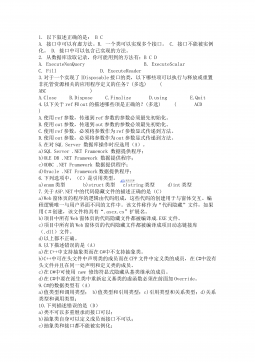
 2024-11-14 29
2024-11-14 29 -
产品需求文档 - 适合敏捷迭代开发的PRD文档应该怎么写VIP免费
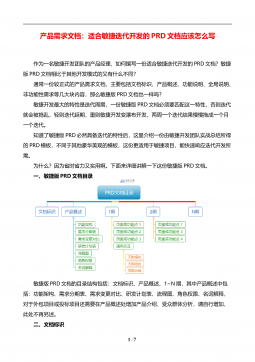
 2024-11-23 5
2024-11-23 5 -
产品需求文档 - 面向产品需求的验证管理VIP免费
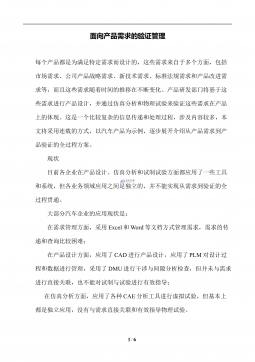
 2024-11-23 4
2024-11-23 4 -
产品需求文档 - 没有标准,只有沟通VIP免费
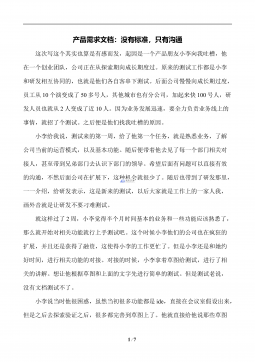
 2024-11-23 4
2024-11-23 4 -
产品需求文档 - 产品需求应该怎么写VIP免费
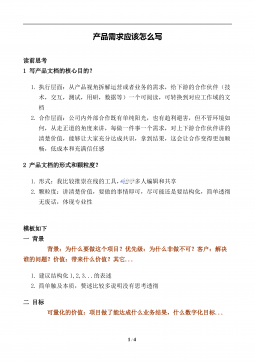
 2024-11-23 5
2024-11-23 5 -
产品需求文档 - 产品需求文档 PRD模板VIP免费

 2024-11-23 33
2024-11-23 33 -
产品需求文档 - 产品需求核心组件分析VIP免费
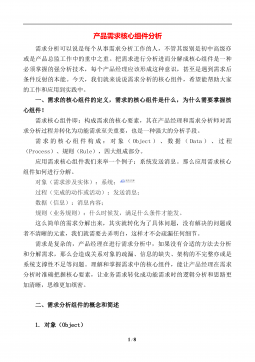
 2024-11-23 45
2024-11-23 45 -
2024版.新高考版.高考总复习.数学.5·3A版1_1集合VIP免费

 2024-11-23 29
2024-11-23 29 -
2024版.新高考版.高考总复习.数学.5·3A版1_1集合(分层集训)VIP免费

 2024-11-23 16
2024-11-23 16 -
产品需求文档 - 产品技能树之需求分析(一)VIP免费
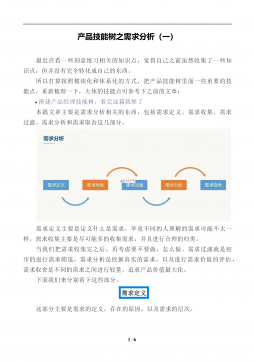
 2024-11-23 9
2024-11-23 9
分类:外语学习
价格:5.9玖币
属性:105 页
大小:370.6KB
格式:PDF
时间:2024-12-12




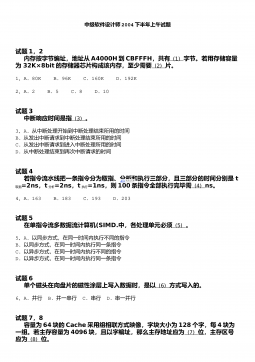
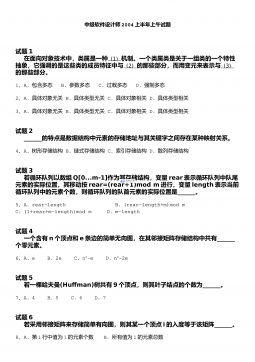

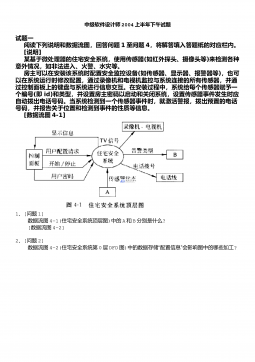
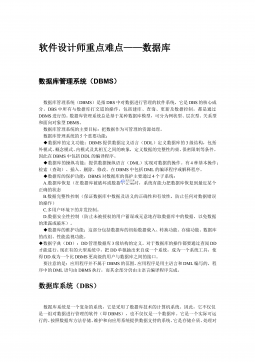
 渝公网安备50010702506394
渝公网安备50010702506394
